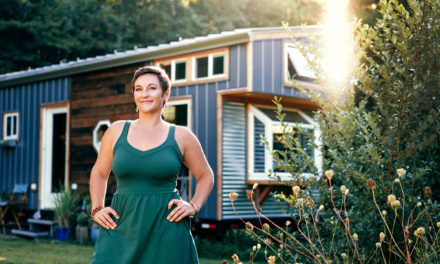When Cari Finelsen left her desk job in New Jersey for a new office gig in Florida in February 2007, the 27-year-old was ready for a fresh start. A new town, a different 9-to-5, and warmer weather all seemed promising at the time. It was exciting for a hot minute, too. But after 8 months, the Sunshine State never quite felt like home, so she decided to return to Windsor, N.J.—with a special friend in tow.
“My first weekend in Florida, I visited a high-kill shelter to adopt a dog. I had always wanted one, but it didn’t make sense for a small apartment,” Finelsen recalls. Down south, space and temperature were non-issues. Drawn to the Rottweiler breed in particular, she asked to see one and locked eyes with an emaciated 32-pound Rottie that melted her heart. Finelsen didn’t care that Sadie had behavioral issues and didn’t know how to walk on a leash or even wear a collar. She took her in, making this sweet stray her new pet project. With the help of a local personal dog trainer, she spent the next 3 months (and about $3,000) making Sadie a healthy, happy, and obedient pup. While Sadie learned to sit, stay, and stop jumping and chewing everything,
Finelsen learned something about herself, too.
“The dog trainer noted that I was really good with her and suggested that I become a trainer myself. The thought had never crossed my mind. I’ve always loved animals and grew up with family pets, but Sadie was my first dog,” says Finelsen. As strange as it sounded, something about it resonated with her. So when she went back to her old HR/accounting job in November, she simultaneously started taking online classes from Animal Behavioral College (ABC), which offers an 11-stage curriculum, including a hands-on externship and volunteer program to become a dog trainer. By May 2009, Finelsen received her ABC certification and began her dog-training side business with a tail-wagging, well-behaved Sadie as proof of her talent.
A call soon came from Camden County Animal Shelter, where Finelsen had previously volunteered, from fellow volunteer Emily Richardson. “She asked if I could work with dogs with behavior issues. If I couldn’t help them, they were going to be put down,” she says. Finelsen immediately gravitated toward Bitsy, a 6-pound poodle-mix that wouldn’t let anyone touch her. “She was so afraid. I spent the day with her and then asked Emily if I could foster her. I had never done it, but I thought it could help,” she says. “When I took her out of the shelter’s stressful environment, she was a nice dog. Bitsy was adopted by an 89-year-old woman, who adored her till she passed away. Bitsy’s now with her daughter.”
After that success story, Richardson continued to call Finelsen about fostering dogs with grave prospects that badly needed a second chance. By the third foster, however, Finelsen found herself dropping $700 out of pocket to pay for the dog’s dental work. With that kind of financial and emotional investment in an animal, she wanted to know where it ended up. But it was part of the shelter’s policy to keep adoptions private. This bugged Finelsen and Richardson, so they began brainstorming a way to improve the foster-care system.
“We agreed that we should start our own rescue so we can pick dogs that we want to take, raise money for vet care, and place them in homes,” she says. And so they did: In October 2010, Finelsen and Richardson co-founded the nonprofit All They Need Is Love Animal Rescue, which, unlike a shelter, operates out of private homes. Five months later, they both attended the 2-week “How to Start an Animal Sanctuary” workshop at the Best Friends Animal Society in Utah to learn the ins and outs of running this business. When they returned, they built a strong network of volunteers in various locations—from New Jersey to Delaware to Pennsylvania. Finelsen herself always has at least two fosters under her roof, where they get nursed back to health and prepared for adoption.
In 4 years, All They Need Is Love Animal Rescue has found permanent homes for 496 foster dogs. Between the demands of the thriving animal rescue and the dog-training business, Finelsen could finally quit her desk job for good in July 2011 and get the fresh start she had longed for.
“I’ve been working to support myself since I was 16 years old. I didn’t have the opportunity to do something I loved. I never thought I would have a career like this. It’s obviously what I’m meant to do,” says Finelsen, now 36, who lives in Sewell with her new husband, Ben. “Our rescue is different in that we’re trainers, so in addition to giving the animals unconditional love they feed off of, we also offer boundaries and discipline. They need a pack leader they will respect and love.” She admits the feeling goes both ways. “These animals give me a sense of purpose, too.”








